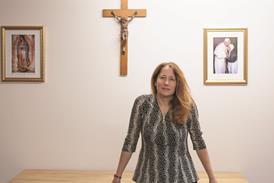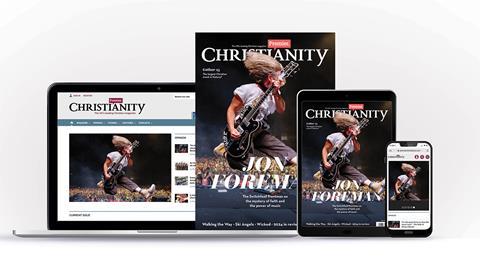Sitting on a Jubilee Line train early on a Sunday morning, on the way to take a confirmation service, it’s not difficult to observe that we’re part of a 24 hour society. Clubbers, sweaty but triumphant, returning home mingle with nurses going on duty and workers from Eastern Europe congregating for work in the construction trade. The vibrancy of London never ceases to fascinate me and gladden my heart.
But there is one thing we miss out on in our round-the-clock existence – rhythm. One of the big drawbacks for people who can work all hours, play all hours, and sleep very little is that we can easily lose our sense of patterns, times and seasons. It’s a function of no longer being close to the earth, of not being an agricultural society. There’s a downside to this, for God built rhythm into our world from the very beginning. Read Genesis 1, that wonderful creation liturgy: “there was evening and there was morning, the first day…”, a pattern repeated throughout the chapter. Or the words of the Preacher in Ecclesiastes 3 – “to everything there is a season, and a time for every purpose under heaven.” That’s not to say that our fractured, joyfully sporadic and wildly spontaneous society makes it impossible to hear God, but it may make us a little deafer to him. Rhythm is good for us. George Gershwin had it right “I got rhythm… who could ask for anything more?”
Rhythm and life
Rhythm helps us experience the grace of God. When the Church hijacked pagan festivals like the winter solstice and transformed it into Christmas, it was a way of helping people celebrate and inhabit the rhythm of the Christian story: Advent and waiting for the coming of the Lord; Christmas and the incarnation; Epiphany - Christ for the whole world; Lent for temptation, penance and discipleship; the events of Holy Week and Easter as we immerse ourselves in Jesus’ death and resurrection; Pentecost for the coming of the Spirit; Trinity for the ordinary, yet extraordinary, stuff of living in the reality of the experience of God, Father, Son and Holy Spirit.
Sandra was giving her testimony at her baptism. She’d come to Christ after a whole string of painful events in her personal life. She spoke of the experience of having no shape to her existence at all. She’d wandered into church and stuck with it. Two things had held her together when everything else was falling apart. One was good and real pastoral care from the priest and the lay leaders of the parish. The other, perhaps surprisingly, was finding God in the rhythm of the church year.
“Like a many-faceted diamond” was how she described it. Through every bit of the year she got a different take on God – but it was the same God. Sandra was living sacramentally in the rhythm of God, though she wouldn’t necessarily have called it that. She knew there were everyday, as well as special, places where God made his grace more real to her. It wasn’t just in the churchy things that she found God’s grace touched her. As she made space for God, she found him in pieces of music, in sunsets, in art – and in less obvious places too, like everyday conversations and films.
Sacraments
So what’s the ‘sacramental’ language all about? At base, a sacrament is something that points beyond itself. The word comes from a Latin root to do with oath or promise. In church history, the meaning of the sacraments has been a huge source of controversy. But in the present day, all kinds of Christians are rediscovering the truth that God breaks into our experience, using the stuff of creation to point us to himself. God creates all kinds of ‘thin’ places, where the division between what is transitory and earthly is pierced and permeated by what is definitive and eternal. Sometimes special places, hallowed by prayer and presence; sometimes right in the midst of the everyday and ordinary.
And, of course, there are places where God has decreed that the walls are to be especially thin – when we experience the two great ‘gospel’ sacraments; baptism and communion. Given to us by Jesus (ordained by him, such that some Christians prefer to call them ‘ordinances’), they speak of the very core of our story, that it is identification with Jesus as we are baptised – symbolically going into the grave and rising again – and in taking communion – feeding on his body and blood – that makes one with him.
The classic definition of a sacrament is an ‘outward and visible sign of an inward spiritual grace given to us.’ That’s hard for our materialist culture to cope with, though there are ways of explaining it. Wedding rings or football shirts as signs of our commitment to spouse or football club come close, but don’t really do it justice. The crucial thing about the two gospel sacraments is that they are given to us by Christ, and act as what the Church calls ‘sure witnesses’ to his relationship with us. More than that, they are symbols of grace.
Symbols and signs
Paul Tillich, the great Christian philosopher and theologian, helpfully distinguishes between symbols, which in mysterious ways participate in the nature of what they point to (a flag, for instance, has a deeper meaning symbolically than just being a coloured piece of material), and signs (like street signs), which just point to something else. The main function of the symbol is to open up the soul to otherwise hidden levels of reality that cannot be grasped in any other way.
The gospel sacraments operate symbolically – when we are baptised, we are incorporated into the body of Jesus Christ; when we take communion, we receive Jesus Christ by faith. Grace and faith meet each other, and the transcendent God breaks into our existence. The Eucharist, the Lord’s Supper, Holy Communion – whatever you call it – is God’s special thin place where he makes himself real to us, day by day, week by week.
Different shapes
What is truly liberating, of course, is discovering that God’s sacramental way of operating isn’t stereotyped. Because he made us as individuals, he treats us as individuals. And the thin places will not be the same for everyone. What will be important is having the eyes of faith to see and embrace the sacramental.
Russ Rook puts it this way: “I believe that God plans to perfect his creation and far from ignoring, bypassing or eradicating this fallen world, he intends to use it. In his hands bread, wine, bricks, mortar, pen, paper and a million materials besides become the media of God’s grace. Through the stuff of this world, I believe that Jesus is really present, really here, really now and really real.”
Loads of young people from the Willesden area went to different places last summer. One party took itself off to Taize, in France, to the community there, and came back raving about having discovered more of God in their lives in a very special and meditative thin place where people from all over the world come together. Others went to a field in Somerset, to Soul Survivor, where the worship was more contemporary and exuberant – they, too, found that God turned up! There’s no magic formula for the sacramental in our lives; God honours all kinds of religious and cultural expressions. That’s because he’s a God of grace, and that’s the stuff he likes to do.
So what?
I’m writing this in the middle of Lent. For many Christians, that’s a time of making resolutions, giving things up, and seeking more of the experience of God in their lives. It might be tempting to read this as another addition to our spiritual ‘to do’ list. But that would miss the message of grace. If you long for rhythm in your Christian existence, then seek it out and go with the flow. But don’t make it a big deal. And if you’re looking for the thin places, those sacramental moments, ask God to reveal them to you.
Jeff Lucas reminds us that in the film The Color Purple, Celie, the slave girl (played by Whoopi Goldberg) looks up at a purple hill, crowned with a deep blue sky, dotted with clouds at the horizon. She nudges the friend she’s walking with, smiles gently, and says “See that? That’s God making a pass at us.”
Nuff said.



























